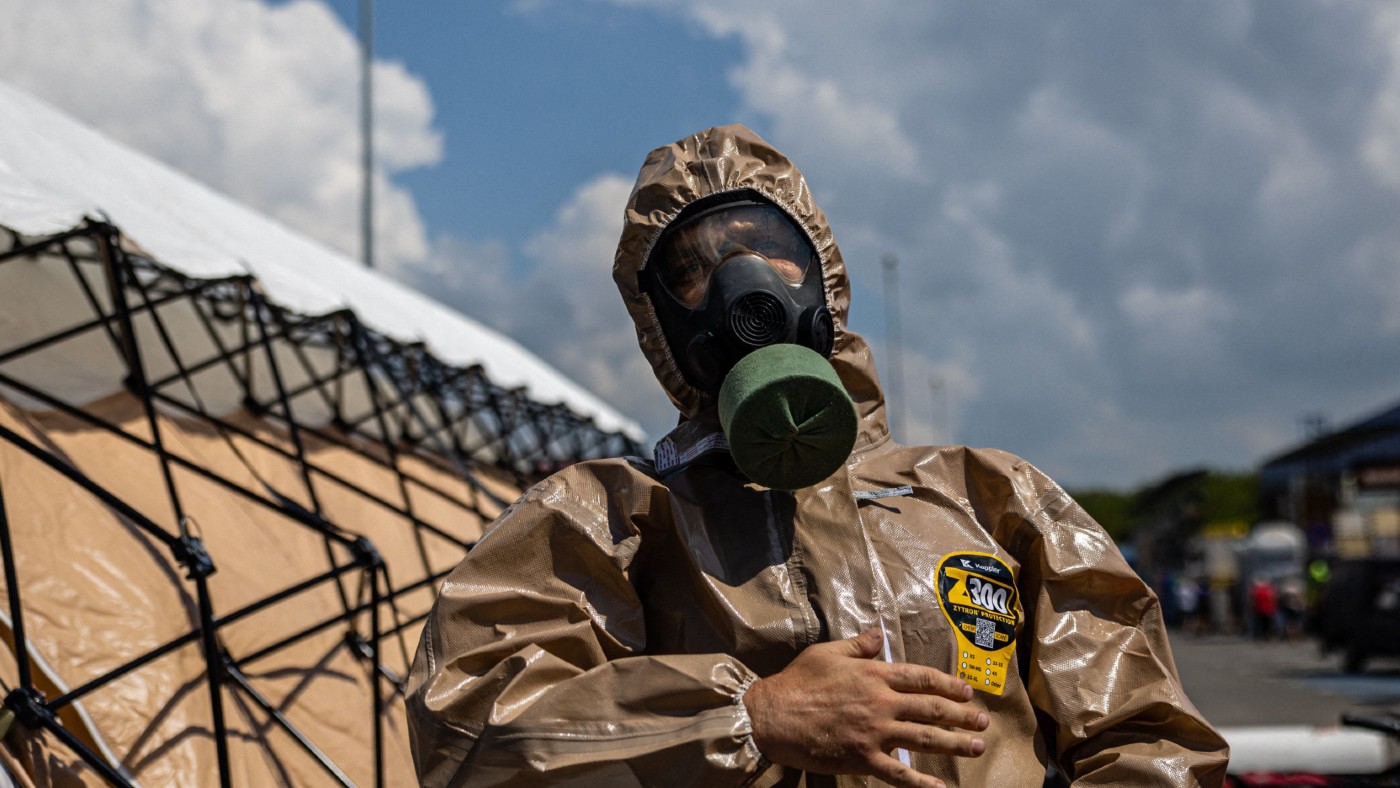Russia’s plans for Zaporizhzhia plant spark nuclear safety fears
Disconnecting Europe’s largest nuclear plant from Ukraine’s power grid risks catastrophic failure, say experts

A free daily email with the biggest news stories of the day – and the best features from TheWeek.com
You are now subscribed
Your newsletter sign-up was successful
A blueprint for disconnecting Europe’s largest nuclear plant from Ukraine’s power grid has been drawn up by Russian engineers, according to a Ukrainian official.
Petro Kotin, head of Ukraine’s atomic energy company, told The Guardian that Moscow was planning to connect the Zaporizhzhia plant to the Russian power network if fighting severed remaining power connections.
During the potential switch-over, the plant in southeastern Ukraine would be reliant “only on a back-up diesel-powered generator, with no further options should that fail”, said the paper. The potential consequences are extreme, according to Kotin. He explained that “if you fail to provide cooling… for one hour and a half, then you will have melting already”.
The Week
Escape your echo chamber. Get the facts behind the news, plus analysis from multiple perspectives.

Sign up for The Week's Free Newsletters
From our morning news briefing to a weekly Good News Newsletter, get the best of The Week delivered directly to your inbox.
From our morning news briefing to a weekly Good News Newsletter, get the best of The Week delivered directly to your inbox.
Kotin told The Guardian that he fears the Russians are now targeting the power connections between Zaporizhzhia and Ukraine’s grid to make the emergency situation “a reality”. “They just started doing that, they starting all the shelling, just to take out these lines,” he said.
The plant has been under the control of Russian forces since March, but is being run by Ukrainian workers. On Wednesday, Reuters reported that two Zaporizhzhia employees had been arrested for passing information to Ukrainian authorities.
Serving and recently escaped workers at the plant told The Telegraph that Russian security forces have been torturing personnel “to prevent them from telling UN inspectors about safety risks”.
The plant’s position close to the frontline, the treatment of its workers and its current condition – with vehicles packed “so tightly into turbine halls that firefighters would struggle to access them if a fire broke out”, said The Guardian – are all contributing to increasing fears of a Chernobyl-style nuclear fallout.
A free daily email with the biggest news stories of the day – and the best features from TheWeek.com
On Tuesday, UN political affairs chief Rosemary DiCarlo told the Security Council that an agreement is “urgently needed” to re-establish the plant as a “purely civilian infrastructure” to prevent a “potentially ‘catastrophic’ disaster”.
Kate Samuelson is The Week's former newsletter editor. She was also a regular guest on award-winning podcast The Week Unwrapped. Kate's career as a journalist began on the MailOnline graduate training scheme, which involved stints as a reporter at the South West News Service's office in Cambridge and the Liverpool Echo. She moved from MailOnline to Time magazine's satellite office in London, where she covered current affairs and culture for both the print mag and website. Before joining The Week, Kate worked at ActionAid UK, where she led the planning and delivery of all content gathering trips, from Bangladesh to Brazil. She is passionate about women's rights and using her skills as a journalist to highlight underrepresented communities. Alongside her staff roles, Kate has written for various magazines and newspapers including Stylist, Metro.co.uk, The Guardian and the i news site. She is also the founder and editor of Cheapskate London, an award-winning weekly newsletter that curates the best free events with the aim of making the capital more accessible.
-
 The ‘ravenous’ demand for Cornish minerals
The ‘ravenous’ demand for Cornish mineralsUnder the Radar Growing need for critical minerals to power tech has intensified ‘appetite’ for lithium, which could be a ‘huge boon’ for local economy
-
 Why are election experts taking Trump’s midterm threats seriously?
Why are election experts taking Trump’s midterm threats seriously?IN THE SPOTLIGHT As the president muses about polling place deployments and a centralized electoral system aimed at one-party control, lawmakers are taking this administration at its word
-
 ‘Restaurateurs have become millionaires’
‘Restaurateurs have become millionaires’Instant Opinion Opinion, comment and editorials of the day
-
 Putin’s shadow war
Putin’s shadow warFeature The Kremlin is waging a campaign of sabotage and subversion against Ukraine’s allies in the West
-
 Epstein files topple law CEO, roil UK government
Epstein files topple law CEO, roil UK governmentSpeed Read Peter Mandelson, Britain’s former ambassador to the US, is caught up in the scandal
-
 Iran and US prepare to meet after skirmishes
Iran and US prepare to meet after skirmishesSpeed Read The incident comes amid heightened tensions in the Middle East
-
 Israel retrieves final hostage’s body from Gaza
Israel retrieves final hostage’s body from GazaSpeed Read The 24-year-old police officer was killed during the initial Hamas attack
-
 China’s Xi targets top general in growing purge
China’s Xi targets top general in growing purgeSpeed Read Zhang Youxia is being investigated over ‘grave violations’ of the law
-
 Panama and Canada are negotiating over a crucial copper mine
Panama and Canada are negotiating over a crucial copper mineIn the Spotlight Panama is set to make a final decision on the mine this summer
-
 The rise of the spymaster: a ‘tectonic shift’ in Ukraine’s politics
The rise of the spymaster: a ‘tectonic shift’ in Ukraine’s politicsIn the Spotlight President Zelenskyy’s new chief of staff, former head of military intelligence Kyrylo Budanov, is widely viewed as a potential successor
-
 Why Greenland’s natural resources are nearly impossible to mine
Why Greenland’s natural resources are nearly impossible to mineThe Explainer The country’s natural landscape makes the task extremely difficult